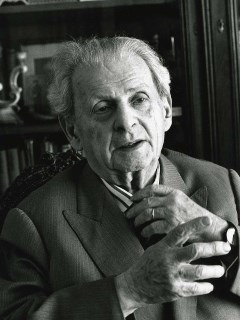
Publication details
Publisher: Springer
Place: Berlin
Year: 2002
Pages: 249-268
Series: Contributions to Phenomenology
ISBN (Hardback): 9789048160822
Full citation:
, "Emmanuel Levinas", in: Phenomenological approaches to moral philosophy, Berlin, Springer, 2002


Emmanuel Levinas
the phenomenology of sociality and the ethics of alterity
pp. 249-268
in: , Phenomenological approaches to moral philosophy, Berlin, Springer, 2002Abstract
Born into a Jewish family in Lithuania in 1906, Levinas left in 1917 for the Ukraine, where he witnessed the Russian Revolution and its aftermath. In 1923, he moved to Strasbourg and became a student of philosophy at the university. He spent 1928 and 1929 studying under Edmund Husserl and Martin Heidegger at the University of Freiburg. After returning to France in 1930 Levinas published his dissertation, La théorie de l'intuition dans la phénoménologie de Husserl (THI). In it he acknowledged the importance of Husserl's recognition of practical and axiological truths with a different ontological structure from theoretical truth (THI, 133). However, Levinas accepted Heidegger's rejection of Husserl's privileging of theory. The Heideggerian reading of Husserl in The Theory of Intuition came to dominate the French appropriation of phenomenology and established Levinas as one of the foremost exponents of phenomenology.
Cited authors
Publication details
Publisher: Springer
Place: Berlin
Year: 2002
Pages: 249-268
Series: Contributions to Phenomenology
ISBN (Hardback): 9789048160822
Full citation:
, "Emmanuel Levinas", in: Phenomenological approaches to moral philosophy, Berlin, Springer, 2002

